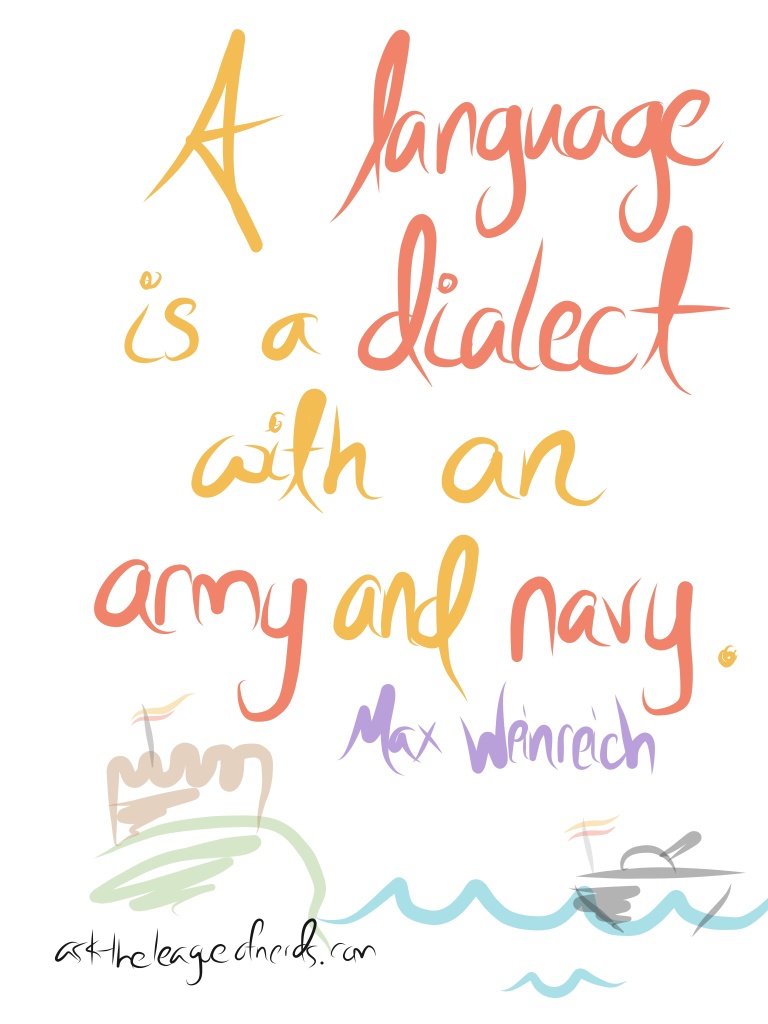Language Nerd,
Spanish and French were once both dialects of Latin, but now they’re different languages… when did they switch from 2 dialects of one language to 2 languages?
***
Dear mysterious anonymous person,
When Spanish and French people stopped being able to understand each other.
Since I’ve been calling myself the Language Nerd for over two years now, it’s about damn time that I defined me.* If two people can understand each other, even if they talk a little different, they’re speaking dialects of the same language. Speakers of Southern White Vernacular might think that Yankees talk funny, but we (mostly) get what y’all are saying. Without study, though, English speakers aren’t going to follow someone speaking German. We’ve got a shared history, but we’re two different languages. To use the fancier linguistics term, English and German are not mutually intelligible.
Like so many sciencey ideas, this clear-cut, simple distinction works great in theory. And then you visit the real world.
Take Hindi and Urdu. One’s a big deal in India, the other’s the main language of Pakistan, and as you may have heard, these two countries don’t always exactly get along. Hindi and Urdu are totally mutually intelligible for normal conversations,** but man, just try convincing those governments that they’re speaking the same language. They’re also written in different scripts, which sure makes them look different, though it doesn’t change the spoken understanding.
Conversely, a pile of thoroughly different ways of speaking get thrown together as one Chinese language. The Chinese government refers to all these as “dialects,” but somebody speaking Mandarin isn’t gonna understand somebody speaking Wu.
Mostly linguists roll with this. Sure, a guy from Norway and a gal from Denmark can get together and discuss the Frozen/Tangled/Little Mermaid Connection Theory, but I’ve never heard a linguist try to argue that this means Norwegian isn’t real. You gotta meet laymen halfway with the terminology.
It gets more tempestuous when people get the idea that one dialect is the language, and all other dialects are lesser offshoots. Linguists are less likely to take this lying down. I’ve said this before, but it’s worth reiterating: all the varieties of a language are just that, varieties. Nothing inherent in Standard American English makes it better, or prettier, or more useful than Southern White English, or Black English, or Valley Girl English. It’s about power, not linguistics. And anyone who’s studied linguistics before knows what that means.
It means I’m about to quote that Weinreich quote that everybody quotes. I can’t help it, okay?
Language looks simple. And people try to take a gut-based, would-be-common-sense approach to understanding it. But the more you dig, the messier it gets. Language is chockablock with politics, and culture, and people’s whims and prejudices, and complications, and general human goofiness. There’s so much straight science to puzzle out, but there’s also so much connection to the world beyond language itself, to the speakers who shape it.
JUST.
LIKE.
ME.

YES. (Photo of Audra McDonald being awesome via playbill.com)
Yours,
The Language Nerd
*Hopefully you were not looking for this to be a “history of Romance languages” post, because yeah, kinda went elsewhere.
**The Hindi-Urdu Flagship notes that if you get into serious religious discussions, the vocabulary splits.
Got a language question? Ask a Language Nerd! asktheleagueofnerds@gmail.com
Twitter @AskTheLeague / facebook.com/asktheleagueofnerds
Man, this stuff is so fundamental to linguistics that it’s hard to remember where I first heard it. Maybe I should just cite my first linguistics course, with the awesome Dr. Dyer. It was supposed to be a more general course, but when he finished a course saying “NEXT time we’ll talk about physics, or astronomy, or literature, or something,” we students would lay money on how long it’d take him to get back to language.
(The best day ever: “Today we’re going to talk about robots. … Did you know the word ‘robot’ comes from Russian?” Boom. Gone. Good times.)
Anyway, specifics on Hindi and Urdu here and here, and Chinese here. If you want more detailed definitions, there’s glottopedia, the linguist’s wiki. And if you’re just looking for a place to start digging into these concepts, you could do worse than Crystal’s Cambridge Encyclopedia of the English Language. Or LanguageLog!
Yeah, I know, the longer you think about that analogy the less sense it makes.
WHATEVER I STAND BY IT 100%.
